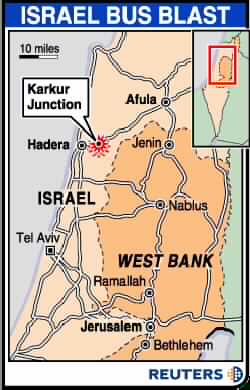HIGHLIGHTS: Attack Likely to Cloud a U.S. Peace Mission Due to Begin Later this Week||Bomber Uses Tactic Rarely Applied Before||Islamic Jihad Claims Responsibility for Attack in Revenge of Recent Israeli Raids in Gaza & the West Bank Killing Several Civilians||Arafat Rejects Attacks on Civilians Be they Israeli or Palestinians||Israeli Pull Back from Hebron Delayed||Attack Raises Questions about Effectiveness of Israel's Reoccupation of Large Swathes of the West Bank|| STORY: Israeli occupation army sources said only one bomber's body had been found, but occupation army spokeswoman Brigadier-General Ruth Yaron said two bombers may have been killed in addition to 14 bus passengers.
Yaron said the bombing was planned by Islamic Jihad in the West Bank city of Jenin, where a curfew intended to keep order and help halt further attacks was lifted only last week.
"Each time we want to give civilians a hope of returning to normal life, we discover in a very painful way that the terrorist structure not only remains but is getting stronger," she said. "We have to reassess the situation."
"We have to see where the terrorist came from, what the support infrastructure was, and whether it had anything to do with Palestinian cities where we might be considering redeployment," the source told Reuters.
Reports last night said a Palestinian resistance bomber killed at least 14 people and injured more than 50 Monday after detonating explosives packed into a car next to a bus in northern Israel, Israeli occupation sources said.
The attack, which raised the possibility of Israeli reprisals and clouded a U.S. peace mission due to begin later this week, turned the bus traveling between the cities of Hadera and Afula into an inferno of screams and burned bodies.
The blast sent a mushroom cloud billowing into the sky and ammunition carried by soldiers riding on the bus blew up in a chain of explosions that reduced the vehicle to a blackened skeleton.
"There were explosions non-stop," said Michael Yitzhaki, a passenger who escaped. "The flames ate up the bus with amazing speed... We didn't manage to get inside to save anyone. It was pretty difficult watching people who we couldn't help any more."
Using a tactic rarely applied during the two-year-old Palestinian uprising against Israeli occupation, a Palestinian pulled up to the rear of the bus while it was picking up passengers and set off explosives, police said.
A police spokesman said the explosion killed the bomber and at least 14 other people.
A few passengers managed to escape, some by crawling from the windows, but others were trapped inside and burned to death.
The Palestinian Resistance group Islamic Jihad claimed responsibility, Hizbollah's al-Manar television station said. Islamic Jihad was behind a similar bombing against a bus in northern Israel last June in which 17 people were killed.
Palestinian resistance men have vowed to avenge Israeli occupation army raids which have killed civilians as well as combatants.
U.S. CONDEMNATION
President Bush, who has dispatched envoy William Burns to the region, condemned the bombing but said it would not derail peace efforts. Washington wants calm while it seeks Arab support for a possible U.S.-led war on Iraq.
Israeli officials held Yasser Arafat's Palestinian Authority responsible for the attack, though the Palestinian leader's aides have always denied such charges.
"You know that the decision of the Palestinian leadership is that it is opposed to attacks against Palestinian and Israeli civilians. We reject such attacks against civilians," Arafat told reporters outside his headquarters in the West Bank city of Ramallah.
It was the first Palestinian bombing in Israel since October 10, when a resistance bomber blew himself up at a bus stop near Tel Aviv, killing himself and an elderly woman.
Monday's attack near the town of Pardes Hanna, 30 miles north of Tel Aviv, raised the prospect of a harsh Israeli military response despite Washington's appeals to keep a lid on the conflict while it prepares for possible strikes on Iraq.
"I was behind the car that blew up, at the traffic light," said Avi, 43. "When the light turned green, he veered sharply to the right lane toward the bus."
"It was like an earthquake. The whole bus is burned and nothing is left of it," Meital Ziskin, a witness, said.
HEBRON PULLBACK DELAYED
The latest bombing raised fresh questions about the effectiveness of Israel's reoccupation of large swathes of the West Bank, which it says is aimed at stopping militant attacks.
It also cast doubt on the Israeli army's already-delayed plans for a limited pullback from the West Bank city of Hebron, widely seen as a goodwill gesture coinciding with Burns' mission.
Burns, on a Middle East tour that will bring him to Israel in mid-week, was expected to ask both sides to restore calm.
European Union foreign policy chief Javier Solana also denounced the bombing, demanding "more commitment to re-establish a fruitful cooperation that should lead to dialogue and peace."
PHOTO CAPTION
A car bomb exploded next to a bus on a road in northern Israel on October 21, 2002, killing at least 14 people, medics said. Witnesses said the blast turned the bus, traveling between the cities of Hadera and Afula, into an inferno that sent a black mushroom cloud into the air. (Reuters Graphic)
- Author:
& News Agencies - Section:
WORLD HEADLINES


 Home
Home Discover Islam
Discover Islam Quran Recitations
Quran Recitations Lectures
Lectures
 Fatwa
Fatwa Articles
Articles Fiqh
Fiqh E-Books
E-Books Boys & Girls
Boys & Girls  Hajj Rulings
Hajj Rulings Hajj Fatwas
Hajj Fatwas














